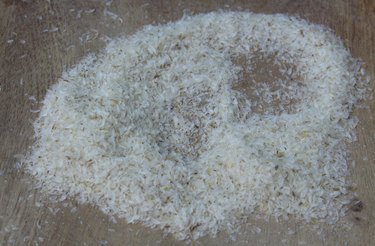
It is safe to take psyllium husk while you are nursing as long as you drink plenty of fluids. Psyllium husk is the outer coating of mucilage around the seed of the Plantago ovata plant, which is grown primarily in India. It is taken for its fiber benefits, which include improved digestive tract health and cholesterol levels.
About Psyllium Husk
Video of the Day
Psyllium husk is pure dietary fiber that passes undigested through the stomach and small intestine. In the colon, it may be fermented by naturally occurring bacteria. The husks absorb water and form a spongy, gelatinous mass that stimulates the bowels to move. A 15-g serving of psyllium husk provides 11.5 g total fiber, 60 to 70 percent as soluble fiber. The recommended fiber intake for women is 25 g daily. A serving also contains 30 calories, primarily from carbohydrate.
Video of the Day
Health Benefits
Psyllium husk softens stools and relieves constipation, hemorrhoids and anal fissures by making stools easier to pass and reducing the need to strain. It reduces cramps, pain and irregularity in irritable bowel syndrome. It improves watery diarrhea by absorbing water and giving texture to the stool. Psyllium husk also lowers total and "bad" LDL cholesterol and may decrease risk of heart disease. Cereals and other products that contain at least 1.7 g psyllium per serving can carry a label claim regarding their heart health benefits. Psyllium may also help lower blood pressure and post-meal blood sugar levels in people with diabetes.
Dosage and Cautions
A typical dose for psyllium is 15 g daily, divided into three doses. Psyllium husk is usually taken as a powder mixed into water or juice. Drink it immediately or it forms a gel that is nearly impossible to drink. DrPullen.com recommends mixing the dose in a small glass of water, drinking it, then chasing it with a large glass of water to dilute it in the stomach. Psyllium can cause gas, stomach pain, diarrhea, constipation and nausea. It may interact with carbamazepine and lithium. If you take an iron supplement, take it one hour before or four hours after your psyllium dose, as psyllium can decrease iron absorption.
Fluid Intake
It is essential to consume adequate fluids when you use psyllium husk. Fluid requirements are increased when you nurse due to milk production. If you breastfeed exclusively, you produce about 25 ounces daily of breast milk. According to the American Dietetic Association, breastfeeding moms need about 13 cups of fluid daily. Keep water, low-fat or fat-free milk or juice handy to sip as you nurse and make it a habit to drink a glass of water or milk after you nurse your baby each time. Limit caffeinated beverages to no more than two or three cups per day. Caffeine is a diuretic that makes you lose more fluid and may cause your baby to become irritable or have difficulty sleeping. Dry mouth, dark-colored urine or infrequent urination are signs that you are not getting enough fluids.
- NIH National Library of Medicine; Blond Psyllium; November 18, 2010
- USDA National Nutrient Database: Find a Food: psyllium seed, husks
- DrPullen.com; Psyllium Husk Benefits; Ed Pullen, MD; March 14, 2011
- UpToDate.com; Maternal Health and Nutrition During Breastfeeding; Nancy F. Butte et al.; August 11, 2010
- American Dietetic Association: Fluid Requirements for Breastfeeding Moms